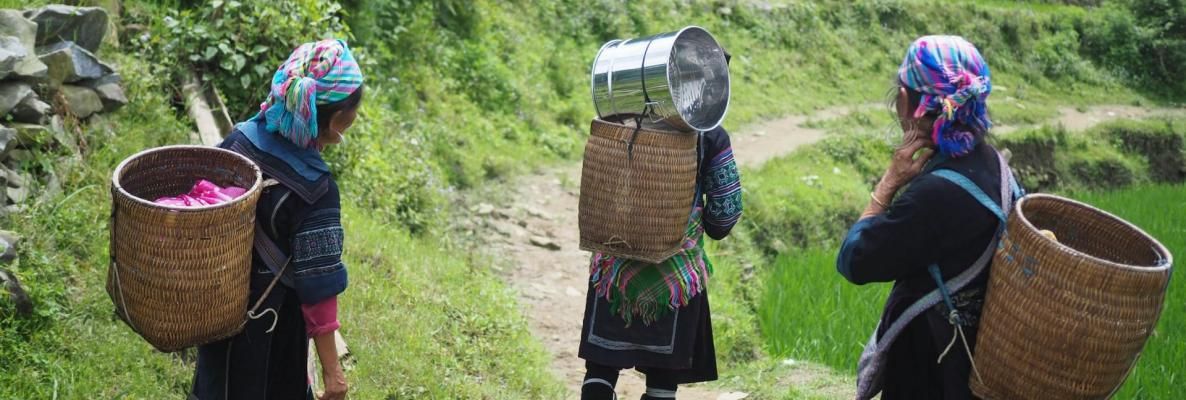How Indigenous Peoples Enrich Climate Action

Credit: Ives Ives / Unsplash
UN Climate Change News, 9 August 2022 - Indigenous peoples have the knowledge and practices needed for the global community to implement and scale-up climate action. Today’s International Day of the World’s Indigenous Peoples presents a unique opportunity to recognize the multifaceted role of indigenous knowledge and practices in stewarding the environment and combatting climate change and its impacts.
Through generations of close interactions with the environment, indigenous peoples safeguard an estimated 80% of the world’s remaining biodiversity. Together, the global community has an opportunity to reorient the way it interacts with nature and build resilience for all through collaborating with and learning from indigenous peoples, the stewards of nature.
“Indigenous communities are actively engaged in managing and caring for our communities. This sustainable management of biodiversity will be passed on to our young people, who will be doing this for a very long time,” said Dr. Victoria Qutuuq Buschman, an Inuit knowledge holder from the Arctic, when speaking about the importance of engaging indigenous experts in climate policies and actions.
The significance and potential of indigenous practices have also been strongly recognized by the scientific community as key approaches to developing and implementing countries’ national climate action plans (NDCs) and National Adaptation Plans (NAPs) under the Paris Agreement.
“Indigenous Peoples have been faced with adaptation challenges for centuries and have developed strategies for resilience in changing environments that can enrich and strengthen current and future adaptation efforts.” – IPCC AR6
Indigenous peoples’ practices
As the world scales up climate action, tried and tested indigenous practices such as those mentioned below have an important role to play:
- Native tree plantation in Nepal which helps store carbon and promotes cultural values associated with forest stewardship
- Community-managed natural forests (or village common forests) in Bangladesh which provide vital services to meet the daily needs of community members and help conserve local biodiversity
- Active revitalization of traditional technologies connected to agriculture, aquaculture and natural resource management in the Pacific, which is a key strategy to mitigate climate change
- Restoration of sustainable loko iʻa or fishpond system done by the Native Hawaiian community, which has the potential to produce thousands of pounds of sustainable protein annually, while mitigating coral bleaching, beach erosion, fish population overkills, and other imbalances in the marine ecosystem.
These indigenous peoples’ practices enrich and accelerate collective progress towards achieving the goals of the Paris Agreement.
Background
Local Communities and Indigenous Peoples Platform
Indigenous peoples and local communities gained greater international recognition under the umbrella of the UN Framework Convention on Climate Change (UNFCCC) with the establishment of the Local Communities and Indigenous Peoples Platform (LCIPP) in 2015 at the UN Climate Change Conference in Paris.
The LCIPP helps amplify their voices and facilitates their effective participation in the United Nations climate process. Work under the LCIPP has already contributed to the collection of insights and experiences relevant to both mitigation and adaptation.
The dedicated LCIPP web portal offers ways for governments, indigenous peoples, local communities and other relevant stakeholders to exchange experiences and good practices for addressing climate change in a holistic way. It builds capacity for engagement and brings together diverse knowledge systems to help inform the design and implementation of climate policies and actions.
Visit the LCIPP web portal here for more information and get involved in the LCIPP activities by participating in events, contributing resources and responding to call for submissions.
Upcoming regional gatherings
Two regional gatherings in the context of the LCIPP work will take place in the next couple of months. They will bring together indigenous peoples, local communities, representatives of governments and other relevant stakeholders to identify climate impacts and exchange good practices to address climate change and build resilience.
The first, representing the Americas and Caribbean regions, will be held in Panama from 12 to 15 September. The second, for the Africa and Asia regions, will take place in Chad from 13 to 16 October.
专业会员
| 我也说两句 |
| 版权声明: 1.依据《服务条款》,本网页发布的原创作品,版权归发布者(即注册用户)所有;本网页发布的转载作品,由发布者按照互联网精神进行分享,遵守相关法律法规,无商业获利行为,无版权纠纷。 2.本网页是第三方信息存储空间,阿酷公司是网络服务提供者,服务对象为注册用户。该项服务免费,阿酷公司不向注册用户收取任何费用。 名称:阿酷(北京)科技发展有限公司 联系人:李女士,QQ468780427 网络地址:www.arkoo.com 3.本网页参与各方的所有行为,完全遵守《信息网络传播权保护条例》。如有侵权行为,请权利人通知阿酷公司,阿酷公司将根据本条例第二十二条规定删除侵权作品。 |
 m.quanpro.cn
m.quanpro.cn


